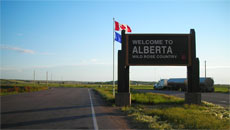First Nations health officials are preparing to test salmon near the site of a massive mine tailing spill in British Columbia amid fears in aboriginal communities that fish from affected lakes and rivers aren't safe to eat.
The provincial government has been testing water in Quesnel Lake and Quesnel River after the tailings dam at the Mount Polley Mine failed last week, releasing millions of cubic metres of water and silt.
Water test results have so far found levels of contaminants such as heavy metals within government guidelines and the province has said the spill isn't a danger to human health or aquatic life.
But the chiefs of the Williams Lake Band and the Soda Creek Indian Band both say members of their communities aren't convinced, and they've stopped fishing in what would normally be the busiest time of the year as salmon return to their spawning grounds.
"People are paranoid and they have every reason to be," Chief Anne Louie of the Williams Lake band said in an interview.
"The timing of it is catastrophic for our people. Right now, everybody would be preparing their fish for the winter, but that has not been done."
The First Nations Health Authority, which oversees aboriginal health care in B.C., says it's developing a salmon tissue sampling program to address concerns about the consumption of fish.
Quesnel River eventually meets the Fraser River, and the testing will focus on salmon in that area, the health authority said. Salmon reach the Quesnel River about two weeks after entering the Fraser.
The health authority said it will test salmon caught by First Nations since the spill and compare those samples with fish caught last year.
"There is currently no indication that the discharges from the Mount Polley Mine tailings pond and subsequently released into the Fraser River would have an immediate impact to those consuming the fish," the health authority's email said.
"However, due to the importance of fish to the subsistence of First Nations people, further testing is desired by First Nations in the affected region."
Until such testing is complete, Louie said members of her community won't be going on the water to catch salmon.
"It's easy for people to say it's OK to eat the fish," said Louie. "They probably don't eat fish from there."
The federal Department of Fisheries and Oceans issued a notice last week closing the recreational salmon fishery on Quesnel River and Cariboo River because of the tailings spill, but the fishing ban doesn't apply to First Nations, Louie said.
Imperial Metals (TSX:III), which owns the Mount Polley Mine, has downplayed the risks associated with the spill, saying the water in its tailings pond was almost drinking-water quality and that the silt was "relatively benign."
Chief Bev Sellars of the Soda Creek Indian Band said she doesn't think anyone knows for sure what leaked out of the tailings pond and what effect it will have on the surrounding environment.
"Our people are not going down the river — they're scared of it," said Sellars.
"There are a lot of questions and it really bothers us that they're saying everything is OK out there. I really think it's too soon to say everything is fine."
Ellen Petticrew, a University of Northern British Columbia professor who specializes in aquatic ecology, agreed that it's too soon to say for sure how the spill will affect salmon and other aquatic life. Those answers, she said, are likely years away.
"They've done certain tests on fish to determine what the lethal doses are for certain contaminants, but we don't know the cumulative effect of this mixture of material," said Petticrew, who is studying the potential effects of the spill along with her colleagues at the Quesnel River Research Centre.
"We can drink bottled water, but the fish can't move away from this."
Petticrew said any heavy metals the salmon pick up while they migrate through the spill area would then travel with them to their spawning grounds, potentially spreading the contamination farther afield.
Imperial Metals did not respond to an interview request on Monday.
The tailings spill has prompted several investigations.
B.C.'s Ministry of Energy and Mines is investigating what caused the breach, as are provincial conservation officers.
Environment Canada has also started its own investigation.
Some residents in the area are still under a ban on drinking or bathing. The ban was partially lifted Friday for the town of Likely, B.C., and northern sections of Quesnel River, but it remained in effect Monday for southern Quesnel River, all of Quesnel Lake, Polley Lake, Hazeltine Creek and Cariboo Creek.
The provincial government said water and debris continues to flow out of the tailings pond, though it has "decreased dramatically." The company is building a temporary dyke to block more tailings from leaking out.
The province has said it will be the company's responsibility to pay for the cleanup.





